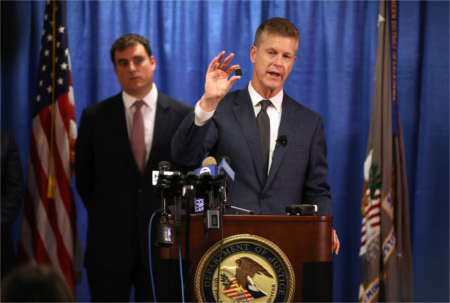
U.S. attorney David L. Anderson displays an SD memory card during a news conference on Sept. 30, in San Francisco, California. The U.S. attorney’s office of the Northern District of California announced a criminal complaint against Xuehua Peng for allegedly delivering classified national security information to China. Photo: Justin Sullivan/Getty Images
by Chad Bouchard
OPC past president William J. Holstein wrote an op-ed piece for The Wall Street Journal warning that the recent arrest of a California tour guide on espionage charges is only a symptom of Beijing’s wider tech espionage campaign. His piece follows news that the U.S. Justice Department arrested Peng Xuehua for allegedly funneling classified American secrets to China’s Ministry of State Security. He noted that FBI Director Christopher Wray said in July that most of the agency’s 1,000 active investigations into intellectual property theft involved China.
“Beijing’s tech theft is a danger to every American and every opponent of the Chinese Communist Party,” Holstein wrote. “The line between commercial and military technology is often blurry – artificial intelligence, for instance, has many commercial and military uses. The party has also directly gone after military secrets. The Navy secretary said in March that his branch and its commercial partners are under ‘cyber siege’ by China.”
Holstein outlines several tech theft cases that came to light in 2019, including fraud charges against Bo Mao, a professor in Texas, for allegations that he stole solid-state-drive technology from CNEX Labs; the conviction of Yi-Chi Shih, an adjunct professor from the University of California, on charges that he hacked systems of a company that makes circuits that use microwave frequencies; a lawsuit from Tesla Inc. accusing former engineer Guangzhi Cao of copying 300,000 company files before taking a job at a Chinese self-driving car startup, Xiaopeng Motors; and news that the FBI and Justice Department busted a four-year hacking operation from the group APT10 out of Tianjin that worked with China’s Ministry of State Security, a campaign that used malware to penetrate U.S cloud computing systems and gain access to IBM and the U.S. Navy.
Holstein called for the U.S. to hammer out comprehensive plan to fight tech espionage. He blasted the Trump administration for shortcomings on this front, noting that recent negotiations with Beijing make no mention of China’s hacking and spying.
“It will require Manhattan Project-like intensity and focus to harden America’s information-technology systems. It will take years and cost billions of dollars,” he said. “U.S. government agencies will have to ask Congress for bigger budgets. Companies will have to devote more money and staff to IT, even if this puts pressure on profits.”
Holstein said security experts have warned that some companies are reluctant to ask for help from Washington, possibly because they fear public blowback as a result of transparency. He said the U.S. has so far been sluggish in its response to China’s espionage campaign, which is “subtle and long-term.” He said companies and U.S. security agencies must work in concert to forge a rigorous strategy on how to respond.
Holstein is author of the recently published book The New Art of War: China’s Deep Strategy Inside the United States. He spoke about the book during an OPC discussion in June with Barbara Demick, who served as Beijing bureau chief for the Los Angeles Times from 2007 to 2017. Holstein covered China from Hong Kong as deputy Asia editor in 1979 and won an OPC award in 1980 for best overseas economic reporting for stories about China’s modernization drive. He has recently spoken about The New Art of War at New York University and at Columbia University with Andrew Nathan, as well as at a day-long event in September hosted by Silicon Dragon.
